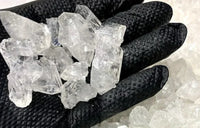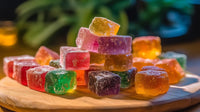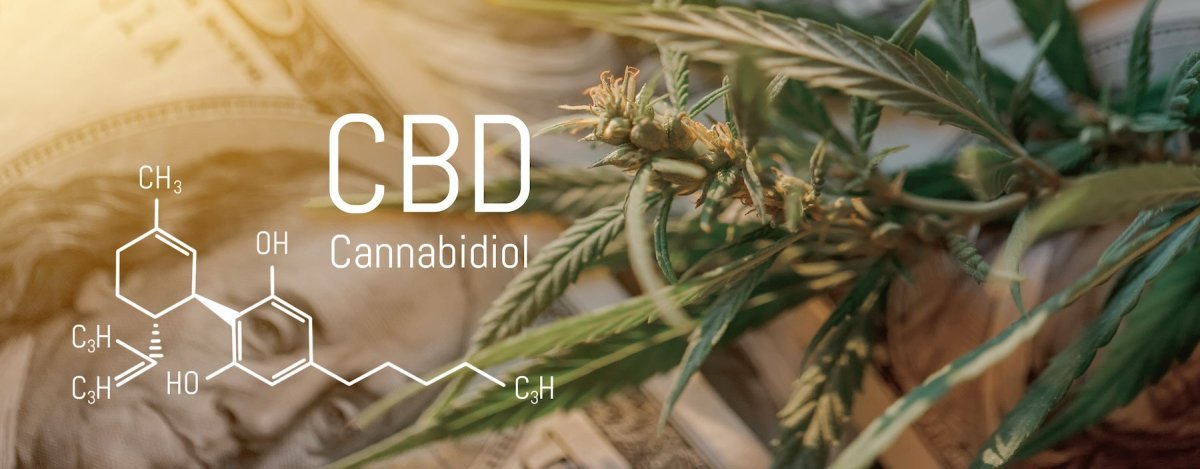Recent posts
-

-
 What Are THCa Diamonds?October 14, 2025
What Are THCa Diamonds?October 14, 2025 -
 Delta 9 Gummies GuideOctober 8, 2025
Delta 9 Gummies GuideOctober 8, 2025 -
 Head High vs Body High: A Guide to Cannabis EffectsOctober 1, 2025
Head High vs Body High: A Guide to Cannabis EffectsOctober 1, 2025 -
 What is THCA Crumble?September 22, 2025
What is THCA Crumble?September 22, 2025 -
 10 Ways to Elevate Self-Care Awareness MonthSeptember 14, 2025
10 Ways to Elevate Self-Care Awareness MonthSeptember 14, 2025

What is Cannabidiol (CBD)?
By Zero Point
Table of Contents
TL;DR:
CBD (cannabidiol) is a non-psychoactive compound found in hemp that interacts with your body's endocannabinoid system to help regulate mood, pain, and sleep. It won't get you high and may offer benefits like anxiety relief, pain reduction, and better sleep. Available as oils, edibles, topicals, and more, CBD is generally safe but can interact with some medications. Always look for lab-tested products and consult a healthcare professional before use.
Introduction to CBD
CBD, or cannabidiol, is one of the most discussed natural wellness compounds. But what exactly is it, and why is it so popular? In this guide, we'll dive into CBD's origins, its potential benefits, usage methods, and address some commonly asked questions.
History of CBD

Thousands of years ago, Cannabis/Hemp grew wild, and was known as medicine. In 1937, when the Cannabis Tax Act was passed, all things Cannabis were made illegal, this included hemp. But now, the world is seeing all the benefits of Cannabis-specifically hemp and CBD.
The first documented use of Cannabis-derived medicine dates back to 2737 BC when Chinese Emperor Sheng Nung used a cannabis-infused tea to aid with a variety of ailments including memory, malaria, rheumatism, and gout. In 1942, American chemist, Roger Adams, made history when he isolated the first cannabinoid - CBD. His research is also responsible for the discovery of THC.
In 1980, Dr. Mechoulam led a study on the potential application of CBD for the treatment of epilepsy as a hypnotic. The study was significant and discovered that daily dosages of 300 mg per day of CBD, cured half of the subjects of seizures and the others exhibited a decrease in the frequency of their seizures. Sadly, the study wasn’t publicized due to drug laws.
It’s important to note the difference between Cannabis, hemp, and CBD. Cannabis and hemp are the same plant, the difference is THC. Cannabis is created by selectively breeding the seeds for THC. Usually, breeders breed to purify and strengthen strains, combine strain traits, or enhance specific characteristics like higher yields, specific aromas, potency, and other things.
Legalization of Medicinal Cannabis, Hemp & CBD in America:
- California became the first state to legalize Cannabis in 1996.
- In 1998, Oregon, Alaska, and Washington followed suit. Though, Oregon decriminalized in the 70’s.
- Hawaii, Nevada, and Colorado legalized in 2000.
Recreational Cannabis legalization in America:
- In 2018, the Farm Bill legalized low-THC Cannabis-hemp, descheduling CBD from the Controlled Substances Act, list of scheduled drugs, making CBD from hemp federally legal
- Colorado and Washington become the first states to legalize Cannabis for recreational use in 2012.
- 2016 was an active year for Cannabis support. California, Nevada, Maine, and Massachusetts legalized recreational cannabis. Arkansas, Florida, and North Dakota legalized medical Cannabis.
As of mid‑2025, only five U.S. states still completely prohibit cannabis in all forms (no medical or recreational access)
What is CBD?
CBD (cannabidiol) is one of the most popular cannabinoids of the 100 or more cannabinoids out there. CBD stands for: cannabidiol and is known as a non-psychoactive cannabinoid. CBD doesn’t have a strong impact on cognitive brain activity and doesn’t cause the high that THC produces. Cannabis and hemp can have different effects on different people; however, generally speaking, no high.
CBD can be found in Cannabis hemp. If the CBD comes from hemp, generally, it has .3% THC or less. If the CBD comes from cannabis, usually, there are higher percentages of THC. The same is true for cannabinoids like CBG (cannabigerol), CBN (cannabinol), CBC (cannabichromene), etc. Even THCA (tetrahydrocannabinolic Acid) isn’t cause for a mental high concern.
How Does CBD Work?

CBD primarily interacts with our body’s endocannabinoid system (ECS), a network of receptors responsible for maintaining balance in various bodily functions like mood, sleep, pain, and immunity.
What Does CBD Do?
CBD interacts with ECS receptors to potentially reduce inflammation, promote calmness, and improve overall wellness. It also interacts with serotonin and GABA receptors, which play key roles in regulating anxiety and mood.
Can CBD Get You High?
No, CBD does not produce a "high." Unlike THC, CBD is not psychoactive, meaning it won't alter your mental state or impair your ability to function.
Benefits of CBD
-
Relief from Anxiety and Stress: Many users report reduced anxiety and stress levels.
-
Pain Management: CBD's anti-inflammatory properties may help alleviate chronic pain and arthritis.
-
Improved Sleep: CBD might help regulate sleep cycles and address insomnia.
CBD Consumption Methods

CBD is versatile and can be consumed in various forms, each offering unique benefits:
-
Oils and Tinctures: Quick absorption when placed under the tongue.
-
Gummies and Edibles: Easy, discreet, and convenient for consistent dosing.
- CBD Concentrate: a very strong form of consumption where the cannabinoids and terpenes are extracted from the plant.
-
Topicals: Perfect for targeted relief of pain and inflammation.
-
Vaping: Rapid effects but with respiratory considerations.
Full-spectrum vs. Broad-spectrum vs. CBD Isolate
-
Full-spectrum: Contains CBD plus trace THC and other cannabinoids.
-
Broad-spectrum: Similar benefits as full-spectrum, but without THC.
-
CBD Isolate: Pure CBD without other cannabinoids or THC.
CBD Safety, Dosage, and Side Effects
Are There Side Effects or Drug Interactions?
CBD is generally safe, but some may experience mild side effects such as fatigue or dry mouth. CBD can also interact with certain medications, particularly those processed by the liver enzyme CYP450. Consult your healthcare provider before starting CBD.
How Much CBD Should I Take?
Dosage varies widely. Factors like body weight, the reason for use, and the type of CBD product all affect optimal dosage. Start with a low dose and gradually increase until you find the ideal amount for your needs.
How Long Does CBD Stay in Your System?
Typically, CBD remains detectable for 2-5 days, although it varies based on frequency of use and dosage.
CBD for Pets
Many don’t believe that pets like dogs and cats are safe in consuming CBD from hemp, but the truth is, pets can consume CBD. Below are some pet CBD studies and their results.
From Cornell University, discussed by ProjectCBD.org:
“Studies evaluating the efficacy of cannabis in treating arthritis in dogs have been completed as well. A recent study from Cornell University showed reduction in pain scores in dogs with arthritis — with no negative side effects — when treated with CBD vs. placebo.4. In a more practical sense, many veterinarians and pet owners have seen the positive effects of medical cannabis for the treatment of arthritis and other forms of pain in animals. The research merely confirms what many of us have seen first-hand.”
From PetMD:
“A survey published in the Journal of the American Holistic Veterinary Medical Association found that, out of 632 people, 72 percent reported using or having used a hemp product for their dog (and 104 tried it with their cat) and 64 percent felt that it helped their pets.”
From Science Daily via the Journal of the American Veterinary Medical Association:
“McGrath, a neurologist at Colorado State University’s James L. Voss Veterinary Teaching Hospital, led a small study with 16 pet dogs to assess the short-term effect of CBD on seizure frequency. Based on her research, McGrath found that 89 percent of dogs who received CBD in the clinical trial had a reduction in the frequency of seizures. Nine dogs were treated with CBD, while seven in a control group were treated with a placebo.”It is important to understand hemp CBD at least on a basic level, prior to shopping for CBD products. Information is key-as much of it as possible, because it is the best way to ensure the best choices are made.
Choosing Quality CBD Products
-
Ensure products are tested by third-party labs.
-
Look for clearly labeled CBD forms (full-spectrum, broad-spectrum, isolate).
-
Avoid brands making exaggerated health claims.
Understanding what CBD is and its potential benefits helps you make informed decisions about integrating it into your wellness routine. Always consult a healthcare professional for personalized advice.








